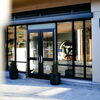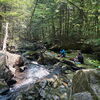Processing Your Payment
Please do not leave this page until complete. This can take a few moments.
- News
-
Editions
View Digital Editions
Biweekly Issues
- December 1, 2025
- Nov. 17, 2025
- November 03, 2025
- October 20, 2025
- October 6, 2025
- September 22, 2025
- + More
Special Editions
- Lists
- Viewpoints
-
Our Events
Event Info
Award Honorees
- Calendar
- Biz Marketplace
Former beer-maker trying his hand at spirits
Ned Wight comes from a long line of distillers. His forebears made whiskey for about 100 years in Maryland until the 1950s, when the Wight family distillery was finally sold. Now, more than half a century later, he's returning to the family trade and opening a small craft distillery in Portland, hoping to profit from a reawakened thirst for artisanal spirits, or what is sometimes referred to as boutique booze.
When he launches New England Distilling, Wight will become Portland's first distillery in many years. He expects to have operations up and running this fall, after he's cleared state and federal permitting requirements.
Wight intends to make gin, whiskey and rum in a gleaming 250-gallon copper still he had custom made in Portugal. Last spring, he moved into a 3,000-square-foot facility in an industrial area off Forest Avenue, where his neighbors include microbrewers Geary's Brewing Co., Allagash Brewing Co., Rising Tide Brewing Co., Bull Jagger Brewing Co. and Maine Beer Co. It's fitting that Wight's located here, because experts predict artisanal liquor will follow a similar trajectory to microbrews, which have grown in popularity over the last two decades.
"There's 7,000 wineries; there's 1,700 microbreweries and there's 300 of us [artisanal distillers]. We're the last in the renaissance," says Bill Owens, president of the American Distilling Institute, an eight-year-old trade group based in California. "There's been a renaissance in food, and it's about being local, to have great pride in what you're doing. We're part of the renaissance in being artisanal and having pride in what you're doing."
At the same time, the overall market for all distilled spirits has grown over the last decade, driven by a proliferating variety of vodkas, scotches, tequilas, rums and other spirits, according to David Ozgo, the chief economist at the Distilled Spirits Council, a national trade association that in 2010 opened its membership to small-scale distilleries. "It's taking market share from beer," he says, "and every time you have a growing market, it creates a niche for craft producers."
Public policies toward liquor sales have also grown more lenient, Ben Jenkins, a spokesman at the Distilled Spirits Council, adds. Since 2000, 15 states changed their laws to allow Sunday sales of distilled spirits, and eight states since 2009 began allowing tastings at off-premise locations, he says, bringing the total number of states that allow off-site tastings to 35.
Wight got his start in the alcohol business by making beer, first volunteering at Ipswich Ale Brewery in Massachusetts and then working at Allagash in Maine. Starting in 2000, he began shopping around for stills, and in 2002 was attending distillery workshops to learn how to concoct spirits. "I've actually been writing my business plan since 2005," Wight says. He has five investors in his LLC besides him, as well as backing from Bath Savings Institution. While "bootstrapping it," he'll probably invest around half a million dollars in his startup. He's the only working employee at the moment.
Although it's taken several years for his micro-distillery to transition from dream to reality, Wight says the timing is right to open now because the industry is taking off.
In 2003, the American Distilling Institute reported 69 distillers in the country. Today, that number's grown to more than 300, according to Owens. He predicts the market will expand to 500 in the next five or so years before leveling off. The sector will stay small, he reasons, because making spirits is more difficult than making beer and wine, and because home distilling is illegal, while making beer and wine is not. Without the support of ardent, small-time enthusiasts, Owens says micro-distillers will likely occupy only a sliver of the market, or 1% of the $40 billion liquor industry in the United States. He also says the upfront costs and delayed profit from having to wait to sell aged products deter some entrepreneurs.
But craft distillers are facing a daunting spirits market, dominated by just a handful of consolidated players, such as Fortune Brands (behind Maker's Mark and Jim Beam bourbons) and the Brown-Forman Corp. Sales of their liquor accounts for roughly 70% of the total market. What artisanal distillers bring to the table, Wight says, is more variety within their brands, as well as the appeal of being local, especially if they use locally sourced grains and products.
Wight says he plans to start by making gin (made from juniper and other botanicals) because gin doesn't need to age in barrels, and in time will sell rye- and wheat-based whiskey from Maine-sourced grains, as well as rum from sugarcane.
Maine is a controlled state for alcohol sales, so Wight will sell his bottles, priced between $30 and $50, to the state, the distribution of which will be handled by Maine Beverage Co. He'll get the word out with "face-to-face marketing," he says, meeting with restaurant owners and bar managers to introduce them to his beverages. And he'll open his facility to tours. Tourism can be an important component of craft distilleries, according to Owens, appealing to visitors interested in local gastronomic cultures.
Wight says he'd like to sell 1,000 cases in the first year and grow to 3,000 to 5,000 cases (a case contains 12 750-milliliter bottles) in the fifth year, and eventually hire four or so employees.
"I'm very ready to go," he says.
Mainebiz web partners

The Giving Guide
The Giving Guide helps nonprofits have the opportunity to showcase and differentiate their organizations so that businesses better understand how they can contribute to a nonprofit’s mission and work.
Learn More
Work for ME
Work for ME is a workforce development tool to help Maine’s employers target Maine’s emerging workforce. Work for ME highlights each industry, its impact on Maine’s economy, the jobs available to entry-level workers, the training and education needed to get a career started.
Learn More
Groundbreaking Maine
Whether you’re a developer, financer, architect, or industry enthusiast, Groundbreaking Maine is crafted to be your go-to source for valuable insights in Maine’s real estate and construction community.
Learn more-
The Giving Guide
The Giving Guide helps nonprofits have the opportunity to showcase and differentiate their organizations so that businesses better understand how they can contribute to a nonprofit’s mission and work.
-
Work for ME
Work for ME is a workforce development tool to help Maine’s employers target Maine’s emerging workforce. Work for ME highlights each industry, its impact on Maine’s economy, the jobs available to entry-level workers, the training and education needed to get a career started.
-
Groundbreaking Maine
Whether you’re a developer, financer, architect, or industry enthusiast, Groundbreaking Maine is crafted to be your go-to source for valuable insights in Maine’s real estate and construction community.
ABOUT
NEW ENGLAND BUSINESS MEDIA SITES
No articles left
Get access now
In order to use this feature, we need some information from you. You can also login or register for a free account.
By clicking submit you are agreeing to our cookie usage and Privacy Policy
Already have an account? Login
Already have an account? Login
Want to create an account? Register
Get access now
In order to use this feature, we need some information from you. You can also login or register for a free account.
By clicking submit you are agreeing to our cookie usage and Privacy Policy
Already have an account? Login
Already have an account? Login
Want to create an account? Register







Comments